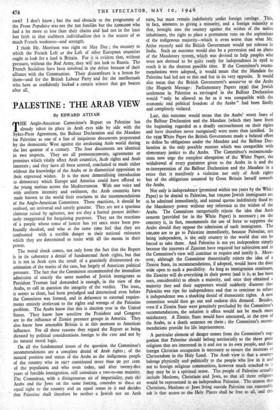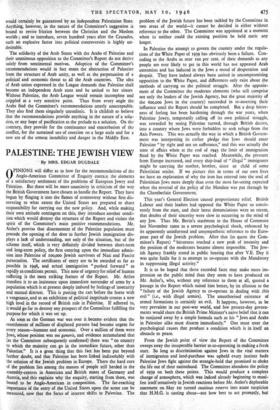PALESTINE : THE ARAB VIEW
By EDWARD ATIYAH
THE Anglo-American Committee's Report on Palestine has already taken its place in Arab eyes side by side with the Sykes-Picot Agreement, the Balfour Declaration and the Mandate for Palestine as one of a line of iniquitous documents perpetrated by the democratic West against the awakening Arab world during the last quarter of a century. The four documents are identical in two respects. They are all pronouncements, agreements or promises which vitally affect Arab countries, Atab rights and Arab interests ; and they have all been uttered, concluded or made either without the knowledge of the Arabs or in diametrical opposition to their expressed wishes. It is the most demoralising introduction to democracy which Europe and America could have offered to the young nations across the Mediterranean. With one voice and with uniform intensity and swiftness, the Arab countries have made known to the world their reactions to the recommendations of the Anglo-American Committee. These reactions, it should be realised, are universal and utterly genuine. They are not a spurious clamour raised by agitators, nor are they a formal protest deliber- ately exaggerated for bargaining purposes. They are the reactions of a people whose sense of justice has yet once more been pro- foundly shocked, and who at the same time feel that they are confronted with a terrible danger to their national existence which they are determined to resist with all the means in their power.
The moral shock comes, not only from the fact that the Report is in its substance a denial of fundamental Arab rights, but that it is not in Arab eyes the result of a genuinely disinterested ex- amination of the merits of the case, but largely of American political pressure. The fact that the Committee recommended the immediate admission of exactly the same number of Jewish immigrants as President Truman had demanded is enough, in the view of the Arabs, to call in question the integrity of the verdict. The issue., it seems to them, had been prejudged and determined even before the Committee was formed, and in deference to external require- ments entirely irrelevant to the rights and wrongs of the Palestine problem. The Arabs know that this is election year in the United States. They know how sensitive the President and Congress are to the influence of Zionist pressure groups in America. They also know how amenable Britain is at this moment to American influence. For all these reasons they regard the Report as being dictated by political considerations_ foreign to the case and not by its natural moral logic.
On all the fundamental issues of the question the Committee's recommendations are a complete denial of Arab rights ; of the natural position and status of the Arabs as the indigenous people of the country who in 1917 constituted more than 90 per cent. of the population and who even today, and after twenty-five years of forcible immigration, still constitute a two-to-one majority. The Committee, with a disingenuous air of impartiality, puts the Arabs and the Jews on the same footing, concedes to thew an equal right to the country and an equal status in it and decides that Palestine shall therefore be neither a Jewish nor an. Arab state, but must remain indefinitely under foreign tutelage. This, in fact, amounts to giving a minority, and a foreign minority at that, brought into the country against the wishes of the native inhabitants, the right to place a permanent veto on the aspirations of the indigenous majority—which is even worse, than what Mr. Attlee recently said the British Government would not tolerate in India. Such an outcome would also be a perversion and an abuse of the Mandatory system,' which was devised to help peoples who were not deemed to be quite ready for independence in 1918 to reach it in the shortest possible time. If the Committee's recom- mendations were adopted, it would mean that the Mandate for Palestine had led not to this end but to its very opposite. It would also mean that the British Government's assurance to the Arabs (the Hogarth Message: Parliamentary Papers 1939) that Jewish settlement in Palestine as. envisaged in the Balfour Declaration would " only be allowed so far as it was compatible with the economic and political freedom of the Arabs " had been finally and completely violated.
Last, this outcome would mean that the Arabs' worst fears of the Balfour Declaration and the Mandate (which they have from
the beginning regarded as a deadly encroachment on their rights and have therefore never recognised) were more than justified. In the 1939 White Paper the British Government made a belated effort to define Its obligations under the Mandate and the Balfour Dec- laration in the only possible manner which was compatible with elementary justice to the Arabs. The Committee's recommenda- tions now urge the complete abrogation of the White Paper, the withdrawal of every guarantee given to the Arabs in it and the re-interpretation of the Balfour Declaration and the Mandate in a sense that is manifestly a violation not only of Arab rights but of the obligations assumed by Great Britain herself towards the Arabs.
Not only is independence (promised within ten years by the Whit: Paper) to be denied to Palestine, but too,000 Jewish immigrants an: to be admitted immediately, and annual quotas indefinitely fixed by the Mandatory power without any reference to the wishes of the Arabs. The Committee categorically rejects the idea that Arab consent (provided for in the White Paper) is necessary ; on the contrary it, in fact, recommends the use of force to suppress the Arabs should they oppose the admission of such immigrants. The 100,000 are to go to Palestine immediately, because Palestine, not being independent, is the only country in the world that can be forced to take them. And Palestine is not yet independent simply because the interests of Zionism have required her subjection and in the Committee's view will continue to require and justify it. More- over, although the Committee theoretically rejects the idea of a Zionist State, its recommendations, if adopted, would leave the door wide open to such a possibility. As long'as immigration continues, the Zionists will do everything in their power (and it is, as has been seen, considerable) to obtain a majority, and once they obtained a majority they and their supporters would suddenly discover that Palestine was ripe for independence and that to continue to refuse it independence was a shocking denial of democratic rights. A new committee would then go out and endorse this demand. Besides, even if a Zionist State were genuinely precluded by the Committee's recommendations, the solution it offers would not be much more satisfactory. A Zionist State would have amounted, in the eyes of the Arabs, to a death sentence on them ; the Committee's recom- mendations provide for life imprisonment.
A particular element of danger comes from the Committee's sug- gestion that Palestine should belong territorially to the three great religions that are interested in it and not to its own people, and that foreign Christian occupation is necessary to ensure the interests of Christendom in the Holy Land. The Arab view is that a country belongs physically and politically to the people who live in it and not to foreign religious communities, however much attached to it they may be in a spiritual sense. The people of Palestine actually include Moslems, Christians and Jews, so that all three religion, would be represented in an independent Palestine. The utmost that Christians, Moslems or Jews living outside Palestine can reasonably ask is that access to the Holy Places shall be free to all, and this
would certainly be guaranteed by an independent Palestinian State. Anything, however, in the nature of the Committee's suggestion is bound to revive friction between the Christian and the Moslem worlds ; and to introduce, seven hundred years after the Crusades, such an explosive factor into political controversies is highly un- desirable.
The solidarity of the Arab States with the Arabs of Palestine and their unanimous opposition to the Committee's Report do not derive solely from sentimental motives. Adoption of the Committee's recommendations would in fact mean the abstraction of Palestine from the structure of Arab unity, as well as the perpetuation of a political and economic threat to all the Arab countries. The idea of Arab union expressed in the League demands that Palestine shall become an independent Arab state and be united to her sisters Without Palestine, the Arab League would remain incomplete and crippled at a very sensitive point. Thus from every angle the Arabs find the Committee's recommendations utterly unacceptable. They also find them singularly unrealistic. It is childish to believe that the recommendations provide anything in the nature of a solu- tion, or any hope of pacification as the prelude to a solution. On th-f. contrary, they provide for the continuance and exacerbation of the conflict, for the sustained use of coercion on a large scale and for a new era of the utmost instability and danger in the Middle East.



























 Previous page
Previous page